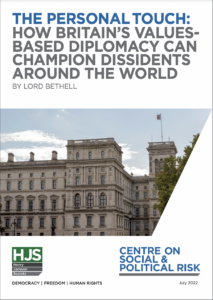 The Foreign Commonwealth, and Development Office “could and should have done more“ to stand up for dissidents around the world, particularly in China, according to a new report.
The Foreign Commonwealth, and Development Office “could and should have done more“ to stand up for dissidents around the world, particularly in China, according to a new report.
In a paper authored for the Henry Jackson Society, Lord Bethell, who served as a health minister during the pandemic, criticised the Foreign Office, for a “disappointing” failure to meet Hong Kong dissidents and Uyghur representatives and for failing to recognise the Taiwanese Representative Office in London.
The author claimed that ministers’ failure to meet with Nathan Law, who has been seeking a meeting for 18 months, was endemic of a “rhetoric gap” in the UK’s response to China. He goes on to describe the Foreign Office’s support for “dissidents and democracy movements” as “too erratic, subject to outside pressures and… not deliver[ing] the required impact”.
The UK’s approach to Taiwan is also “out-of-date”, according to Bethell. More broadly he claims that “the UK lacks a clear strategy when it comes to helping to improve China’s human rights record”.
The paper also considers the UK’s response to dissidents from other nations, including some of the UK’s geopolitical allies.
Bethell recommends that the Foreign Secretary, Liz Truss:
- Establishes a “Tea-hugs-and-selfie outreach” to welcome dissidents to the FCDO and champion their causes.
- Closes the rhetoric gap by making sure action matches ministerial declarations of support for dissidents.
- Having suffered from cuts, the FCDO budget for human rights should be restored or even enhanced.
- Institute a “university of dissent” that offer courses and education to dissidents living in the UK on how they can encourage democracy in their countries.
- Invest further in the values-based envoys; increase the resources available; create greater latitude for those envoys seeking to champion their field and build a more systematic roster of appointments.
READ THE REPORT HERE


